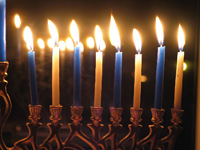By Natasha Rosenstock, JTNews Correspondent
To give or not to give, that is the question. To give what? In this case, two things: A meaningful Hanukkah experience, and gifts each night of the festival.
Don’t worry, JTNews hasn’t become like department stores who advertise for Christmas in October.
However, while it may be a bit late for this year, I do think it is useful to start discussing Hanukkah one month before the festival. That’s because I’m talking about planning ahead of time for a meaningful holiday, rather than simply getting a head start on shopping for gifts.
In case you are tempted to blame yourself for the perpetuation of celebrating Hanukkah in competition with Christmas, let me provide some historical context and tell you it’s not your fault. In fact, your synagogue may have told you to do it.
Dianne C. Ashton is the Director of American Studies at Rowan University in Glassboro, N.J., and the author of an upcoming book, The American Chanukah.
“Hanukkah festivals for children in the synagogue started in the 1870s in the Reform congregations and they were very definitely trying to find ways for Jewish children to be as interested in their religion like churches were doing with Christian kids,” Ashton says. “And then the Conservative movement picked up on it — not just the presents but the concern for Jewish children remaining interested in Judaism and enlivened by it in December, so Hanukkah festivals became one way to promote that.”
So what to do when your own synagogue might be encouraging you to celebrate Hanukkah in competition with Christmas? Your children are bombarded with media messages promoting the gift-giving spirit of the season, and they may also be receiving gifts from well-meaning relatives.
Rabbi Sandy Rubenstein is the director of Jewish Chaplaincy Services at the Jewish Social Service Agency in Rockville, Md. She has advice for families struggling with these issues: “If gifts are emphasized, how can we think about them in a different way? There are ways to bring in new meaning to the holiday,” she says. “You can do things that are not about giving gifts, but lighting candles, and talk about ways to rededicate ourselves to what’s important to us. We can light candles for justice or peace or talk about what brings light into my life and your life and what are the places that need light in this world?”
She says parents should ask themselves, “If you don’t want gifts to be dominant, how do you create meaning in the holiday so it’s not about kids feeling bad about Christmas?”
I spoke to a number of moms who have either dismissed the gift-giving culture and only give the traditional gelt, or perhaps started out giving one gift each night and then moved away from that.
Here are some of their ideas to bring meaning back into the festival and cut down on the emphasis on Christmas-style consumerism.
• Give your kids $1 for each candle, each night. At the end of eight nights, they’ll receive $36.
• Use Hanukkah gelt to teach your kids a lesson about spending wisely. They can decide if they want to spend their Hanukkah gelt on a toy for themselves, something else, or pool it with their siblings for one larger item everyone can enjoy together.
• Before kids receive new gifts for Hanukkah, have them go through their toys and determine what they no longer play with so they can donate those items. They will recognize that part of receiving gifts is also to give to children who are less fortunate.
• Use that time of year to collect the money from the tzedekah boxes around your house and have your children help make the decision about where to donate the money. Let them physically donate the money themselves and/or see the effects of their donation.
• If you do feel pressure to give your kids some type of gift every night, spread out the giving among yourself and other relatives.
• Gifts can be items you would have bought your children anyway, like new school clothes, pajamas or books.
• Do not try to compete with Christmas. Tell your children it is okay for others to celebrate their own holiday their way and for you to celebrate your holiday another way.
Happy Hanukkah!
Natasha Rosenstock is a writer living in Potomac, Md. You can visit her at www.natasharosenstock.com. This piece originally appeared in the Washington Jewish Week.
